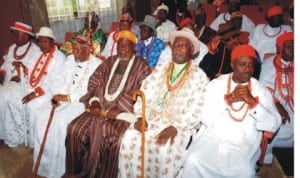Business
Dankwambo Urges Support For FG On Railway Rehabilitation

Some of the Traditional Rulers of Oil Mineral Producing Communities of Nigeria (Trampcom), during their meeting with President Goodluck Jonathan at the Presidential Villa in Abuja, last Saturday. Photo: NAN
Governor Ibrahim Dankwambo of Gombe State has urged the people of the state to cooperate with the Federal Government on rehabilitation of the railway lines in the area.
Dankwambo made the call during the presentation of items aimed at economic empowerment of the people of the state by an organisation, ‘Talba –Neighbour-to-Neighbour’ (Talba-N2N), in Gombe on Saturday.
He called on those who had erected structure close to the railway lines to cooperate with the contractors on the rehabilitation work.
According to him, if the people of the state do not cooperate with the contractors, all efforts of the Federal Government in rehabilitating the rail line that passes through the state will be futile.
The governor said that through the cooperation of government and people of the state, the Nigerian National Petroleum Corporation was presently pumping fuel from the refineries to the state.
He commended Federal Government for the decision to establish rice mills in the state and Ashaka Cement Company for expanding the company.
He said that would go a long way in boosting trade and commerce as well as reducing poverty in the state.
The governor commended the oragnisation for providing poverty alleviation items to the people of the state, and called on other well-to-do persons in the state to emulate it.
Chairman of the occasion, who is the Minister of Transport, Sen. Idris Umar, commended Dankwambo for the developmental efforts he provided the people of the state.
Umar called on the people of the state to continue to support the governor in his determination to develop the state to an enviable height.
Chairman of T-N2N Alhaji Bala Tinka said the organisation aimed at assisting the less privileged across the state with funds and items for poverty alleviation, among others.
He said vehicles, motorcycles, sewing machines and other economic empowerment facilities had been provided to the less privileged, and that the gesture would continue.
Tinka explained that the organisation was moved by the developmental efforts of Dankwambo in the state, hence the decision to compliment his efforts.
The Tide source reports that the occasion was attended by the Deputy Governor of the state, Mr. Tha’anda Rubainu, members of the National Assembly and other personalities.
Transport
Automated Points Concession : FAAN Workers Gave 72hrs To Revise Decisions In PH

Transport
FAAN Announces Pick-Up Points for Go-Cashless Cards

Business
Fidelity Bank To Empower Women With Sustainable Entrepreneurship Skills, HAP2.0
-
Politics3 days ago
2027: NIGERIANS FAULT INEC ON DIGITAL MEMBERSHIP REGISTER DIRECTIVE
-

 Environment3 days ago
Environment3 days agoLAWMA Director Says Sweeping Reforms Have Improved Waste Collection
-
Politics3 days ago
LP Crisis: Ex-NWC Member Dumps Dumps Abure Faction
-

 Politics3 days ago
Politics3 days agoUmahi Dismisses Allegations On Social Media, Insists On Projects Delivery
-

 Sports3 days ago
Sports3 days agoAbia Not Sure To Secure continental Ticket
-
Sports3 days ago
La Liga: Yamal Records First Career Hat-trick
-
Politics3 days ago
NATASHA ELECTRIC VEHICLES INITIATIVE IN KOGI CENTRAL
-

 Sports3 days ago
Sports3 days agoPSG Extend Lead In Ligue 1

